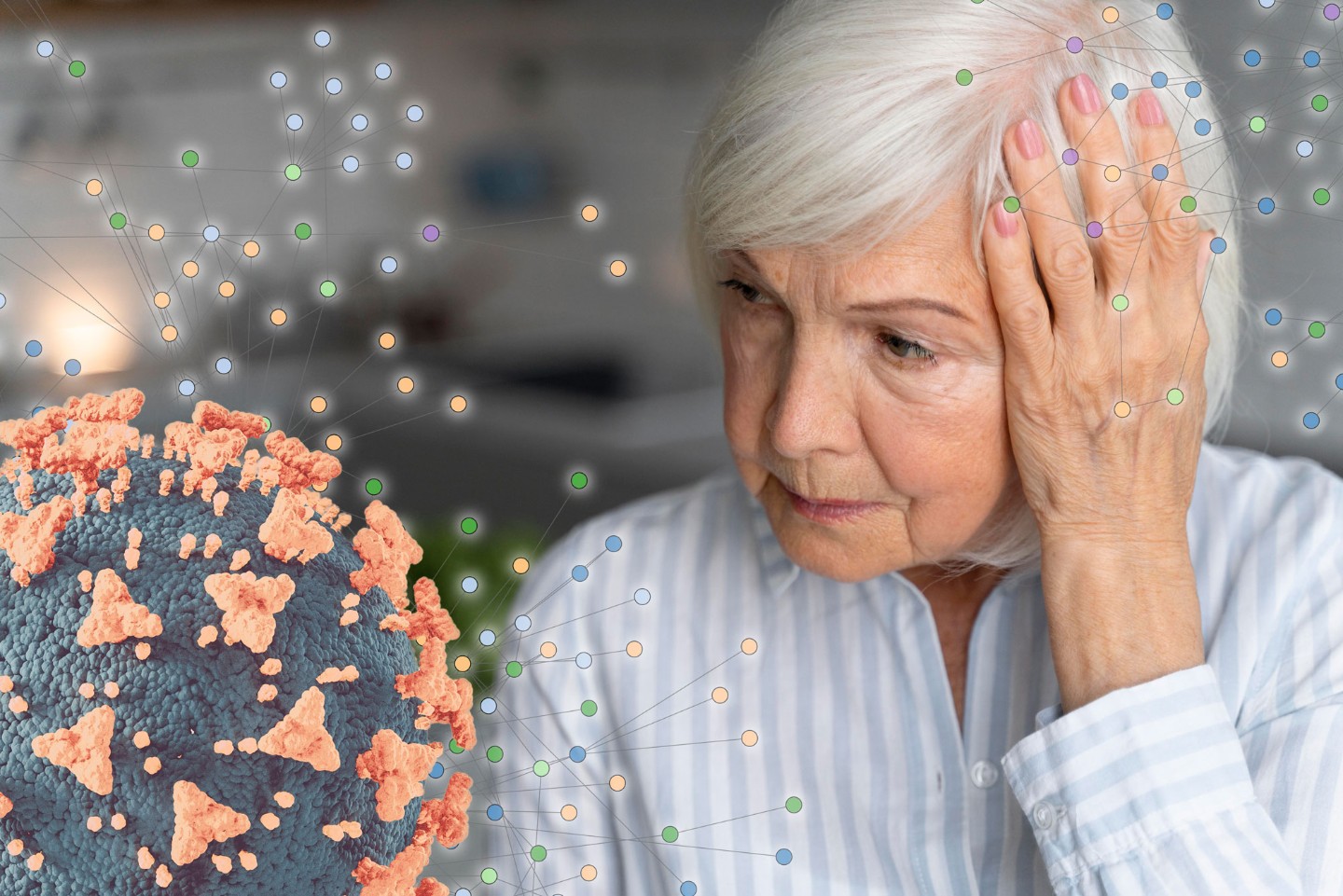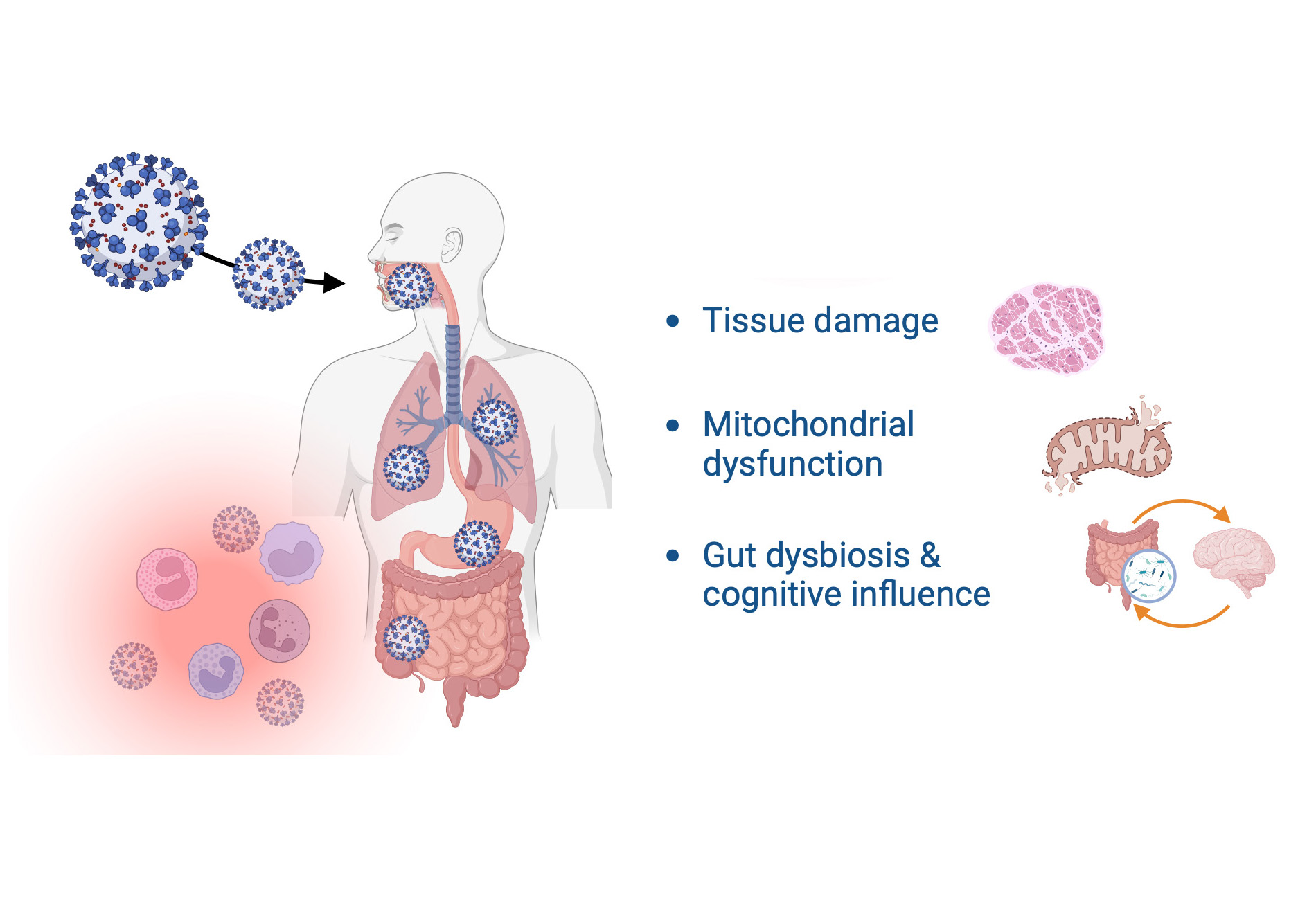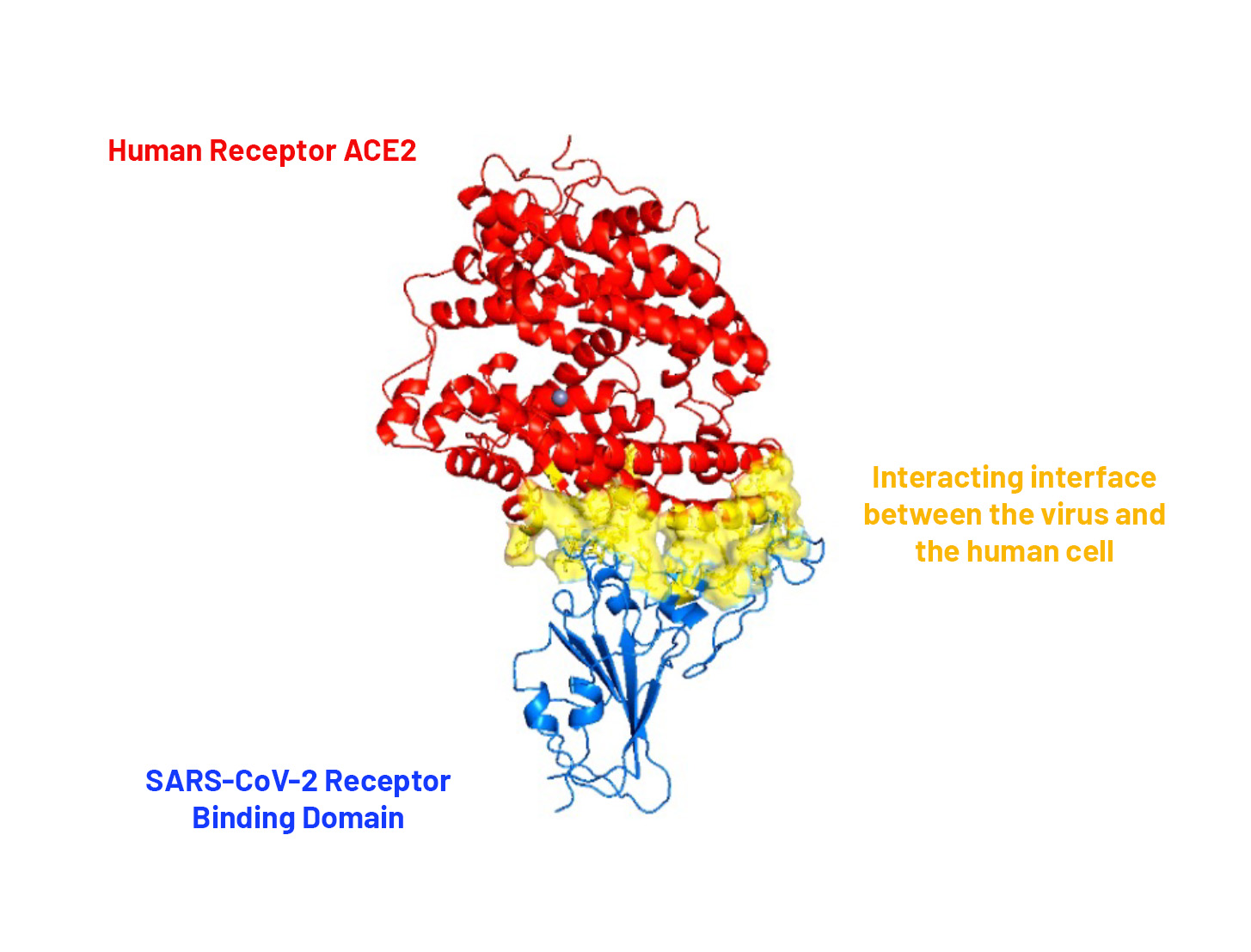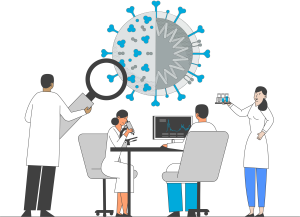Early in the pandemic, scientists at the University of Luxembourg started to use their expertise to better understand the virus, its acute symptoms and longer-term consequences, and find effective responses against its propagation. Even if the crisis has passed, researchers are still investigating different aspects of the disease.
Making good use of the interdisciplinary skills available at the University, different projects are currently focusing on the links between COVID-19 and neurodegeneration, and on how to treat long COVID. This continued research, supported through the national CoVaLux programme, is crucial to fully elucidate the effects of the SARS-CoV-2 virus, find ways to mitigate them and be better prepared for future pandemics.
Large studies that are still bearing fruits
Launched in April 2020, CON-VINCE was one of the large-scale studies instigated by researchers in Luxembourg. This initiative recruited over 1800 participants nationwide, collecting a vast amount of information on the prevalence and transmission of the disease, and capturing the dynamics of the virus in the country.
With findings published in BMC Infectious Diseases as recently as the beginning of 2024, the data analysis is still giving new multidisciplinary insights, from how immunity built up in Luxembourg to the impact of the pandemic on psychological wellbeing of the population. “For example, our longitudinal study highlights the importance of assessing the malign effects of the pandemic not only from the infection perspective but also from the mental health point of view,” details Prof. Anja Leist from the Faculty of Humanities, Education and Social Sciences (FHSE), one of the authors of this publication. “At a point, we observed an increase in depression, anxiety and loneliness, especially in women and younger participants. So, investigating how these parameters evolve over time and what could be the lasting impact on mental health for Luxembourg residents is very much still relevant.”
In addition to data analysis, the existing biological samples stored at the biobank will prove equally useful to study the possible long-term consequences of the virus on brain health. In the framework of COMMUTE, a European project that started recently, they will be used to better understand how infectious diseases such as COVID-19 can impact individual risk to develop neurodegenerative disorders.
COVID-19 and neurodegeneration
Scientists worldwide keep unravelling various aspects of the virus’ impact on the human body. Beyond its well-documented respiratory symptoms, emerging research suggests a potential link between COVID-19 and neurodegeneration. In May 2024, researchers at the University of Luxembourg contributed to this global effort with a scientific article in The Lancet Neurology discussing how COVID-19 may exacerbate or even trigger neurodegenerative diseases.
Dr Josh Berryman, researcher at the Faculty of Science, Technology and Medicine (FSTM), coordinated an EU workgroup of doctors and professors who assessed the existing evidence.

He summarises their findings: “The short answer is that COVID-19 can lead to neurodegeneration in susceptible individuals but that so far the risk does not seem to be hugely greater than for some other illnesses. Not every COVID-19 patient will end up with a neurodegenerative disease.”
The exact mechanisms underlying the initiation of neurodegeneration after a SARS-CoV-2 infection are not established yet and further investigations are warranted. One hypothesis is that viral particles can linger in the body for long timescales after recovery and that the remaining SARS-CoV-2 proteins could trigger amyloid deposition, a well-known hallmark of Alzheimer’s disease. The infection also seems to increase the aggregation of the protein tau, another causative factor for Alzheimer’s. Lastly, the systemic inflammation triggered by COVID-19 could have long-term consequences for brain health as chronic inflammation has been implicated in the pathogenesis of several neurodegenerative diseases.
“We already knew that some viral infections could cause neurodegeneration,” explains Prof. Michael Heneka, director of the Luxembourg Centre for Systems Biomedicine (LCSB) and member of the same group. “It now looks like COVID-19 is one of them, with findings that indicate that the risk of progressive neurological impairment as a sequela of the virus is significant.” In light of these results, SARS-CoV-2 infection should be considered as a risk factor for Alzheimer’s disease and patients with sequelae should be followed up.
Long COVID: exploring a complex condition
While these research results highlight the importance of monitoring COVID-19 survivors and conducting longitudinal studies to assess the long-term neurological outcomes of the disease, other projects focus on better understanding long COVID and finding treatment strategies for patients.
The syndrome occurs in up to 10% of cases and can significantly affect daily activities. Its duration and severity vary widely, with symptoms that include fatigue, shortness of breath, pain and cognitive impairment. Defining what is happening exactly during long COVID remains difficult.

The syndrome could cascade from an exaggerated immune response and involve sustained neuroinflammation, damage to blood vessels and metabolic dysregulation. “Although some symptoms seem to be unique to long COVID, there is a large overlap with a condition called myalgic encephalomyelitis/chronic fatigue syndrome that can develop after a viral infection,” details Prof. André Schulz, researcher in the Department of Behavioural and Cognitive Sciences at the FHSE. “So, with SUMCO, we want to investigate the potential shared mechanisms between these two diseases through a psychological and physiological assessment. It may help to better diagnose the two patient groups and to be more efficient when looking for possible treatments.”
Searching for effective treatment options
“The complexity of the diverse symptoms involving multiple organs often make current treatment inadequate and create the need for alternative therapeutic solutions,” adds Prof. Jochen Schneider, head of the Medical Translational Research group at the LCSB. “Since the gut–brain axis is strongly involved in the pathways affected by long COVID, fasting diets are emerging as a potentially effective treatment.”
Caloric restriction and periodic fasting target inflammatory processes and gut microbiome imbalance, two hallmarks of the syndrome. This is why FastCoV, an interdisciplinary research project that brings together the expertise of several research institutions and hospitals in Luxembourg and Germany, investigates fasting as an effective treatment option for long COVID. “Participants, recruited through the long COVID division of the Rehaklinik in the Centre Hospitalier Neuro-Psychiatrique (CHNP), will undergo a 7-day supervised fasting programme, before returning to their routine diet or following an anti-inflammatory diet,” explains Dr Raquel Gómez Bravo, clinician-scientist at the CHNP. “In the end, we aim to provide high-quality evidence on the effects of caloric restriction on long COVID symptoms, potentially leading to tailored interventions for this complex condition.”
Understanding SARS-CoV-2, an interdisciplinary endeavour
The diverse projects carried out at the university showcase that a combination of expertise in biomedicine, clinical studies and social science approaches is key to studying a complex phenomenon such as COVID-19.
The list of disciplines doesn’t stop there: data science and bioinformatics are just as essential. During the pandemic, several contributions by university researchers, from modelling the spread of the virus to identifying at-risk patients thanks to a machine learning approach, highlighted that the fight against COVID-19 was an interdisciplinary effort.

This is still true today. COMMUTE, the European project involving the teams of Prof. Rejko Krüger and Prof. Reinhard Schneider, will for example rely on artificial intelligence for analysis and on data curation to convert vast amounts of scientific literature on the SARS-CoV-2 virus into “knowledge graphs”. In the framework of another project, work by bioinformaticians and physicists from the LCSB and FSTM is also coming to fruition with the development of the Persistence Score, a new method to assess the pandemic potential of SARS-CoV-2 new variants of concern. “We focused on the interactions between the SARS-CoV-2 Receptor Binding Domain and the human receptor ACE2,” explains Prof. Alexander Skupin, head of the Integrative Cell Signalling group at the LCSB. “By using highly detailed data and molecular dynamics simulations, we can evaluate the risk in terms of increased transmissibility of a variant, including possible future recombinant variants like Deltacron.” Designed to allow for early adaptation of mitigation strategies and data-driven policymaking, this method should join the toolbox for pandemic preparedness.
CoVaLux, a coordinated effort at the national level, at the crossroads of immunology, psychology, epidemiology, digital health, social science and public health, is maybe one of the most interdisciplinary projects currently ongoing in Luxembourg. Since 2021, researchers from the university and several other institutions, led by Prof. Paul Wilmes at the LCSB and Dr Guy Fagherazzi at the Luxembourg Institute of Health, work together to address key questions related to vaccination and the longer-term health consequences of COVID-19. Today, this extensive programme provides the resources for continued sample and data collection as well as analysis.
In November 2024, the CoVaLux team will gather on campus Belval for an event dedicated to long COVID, highlighting that, beyond the diverse skills needed to explore all the facets of this disease, long-term research is another key aspect. Continued studies are crucial to fully elucidate how the virus works, to better understand its persistent impact on our societies and to develop targeted interventions to mitigate its effects. This is also how we can be better prepared when the next pandemic comes.
Credit for the last image: Dr Thais Arns
Meet the researchers
Assist. Prof Jochen SCHNEIDER
Assistant professor / Senior research scientist, Medical Translational Research group
-

Dr Raquel GOMEZ BRAVO
Clinician-scientist at the Centre Hospitalier Neuro-Psychiatrique (CHNP)
Prof Reinhard SCHNEIDER
Full professor / Chief scientist 1 in Bioinformatics, Head of bioinformatics core facility
Assoc. Prof Alexander SKUPIN
Deputy Director of LCSB, Associate professor/Chief scientist 2 in Modelling of Biomedical Data
